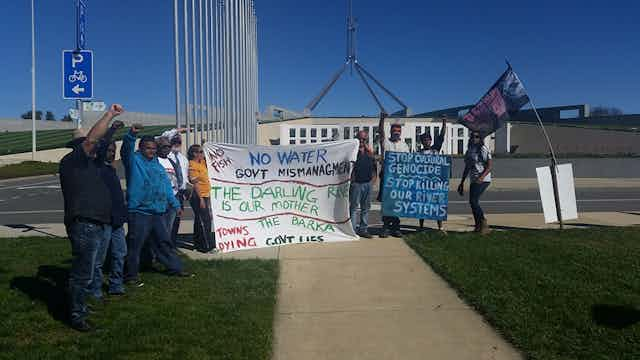As I left the outback New South Wales town of Wilcannia after some historical research last year, Woddy Harris, a Barkindji man I had interviewed, gestured across the town and said: “Mother Nature will outlive all of this.” He was talking about Aboriginal survival in the Wilcannia area since white settlement in the 1850s.
Wilcannia is on the Darling River, about 200km east of Broken Hill. In Barkindji language, “Barka” means river. They are the “Darling River folk”, to use anthropologists’ terms; “people of the river”, to use their own.
Last week, when I saw a recent photograph of the Darling River – central to Barkindji survival – I feared that perhaps Woddy was wrong. Maybe Mother Nature does need our help after all.

Land, water and Wilcannia
The Wilcannia area was colonised in the mid-19th century by sheep-farming squatters. Wilcannia was valued for its place on the river, which was like a highway for colonial-era New South Wales. It was a jewel of colonisation, known as the “Queen of the Desert”. For a time, Wilcannia was NSW’s third-largest inland port.

Today, much of that colonial wealth is gone. The land that was once immensely valuable to settlers is now much less so; sheep farming in the desert does not yield the profits it once did. Since the late 1980s, the population of Wilcannia has declined markedly. The average household income is now less than one-third of the national average.

While land has lost value, water has not. Fruit and cotton farmers further upstream use water from the Darling and its tributaries to irrigate their crops. This water is hotly contested as an exceedingly valuable commodity.
Of the roughly 600 residents of Wilcannia, most are Aboriginal, predominantly Barkindji people, who have lived continuously on this country since before European settlement. In contrast to earlier periods, when valuable land was solely the property of station owners, a good deal of the land around Wilcannia is now Aboriginal-owned, as is a local sheep station.
The river, however, for all intents and purposes, is the “property” of the farmers upstream. As a result of their irrigation, in parts of Barkindji country, the river is little more than a sequence of stagnant pools at certain times of the year.
The Barkindji are now embarking on a campaign to save the river. This week about 30 campaigners travelled to Canberra’s tent embassy to highlight the damage to their mother river.
Aboriginal survival
I have had conversations with many people in Wilcannia about the ways in which Aboriginal people navigated the settler economy as it changed and developed in the region. Among stories of employment, housing and supporting children, I was repeatedly told of Aboriginal people’s ability to go into the bush and find food and water. They did not need to take anything with them; they could leave their dishes behind, knowing they could find and make new ones.

This knowledge that “the bush is there to nurture you”, as one woman evocatively told me, is a physical, embodied experience. Yet after hearing several versions of this bush-nourishment narrative, I realised that the claim is partly metaphorical too. The people I spoke to not only wanted me to know something of Aboriginal camping habits, but were also describing a stance towards the world, an attitude that has underpinned Barkindji survival.
For the Barkindji, the river is governed by the same logic as the bush: it nourishes, both literally and metaphorically.
Their anger over the state of the river and their commitment to caring for their “mother” show that the belief that Mother Nature will nourish them is not a one-way, narcissistic vision of a universe centred on the self. Rather, the logic of Barkindji survival is about mutual responsibility, a relationship to the mother. “You look after Mother Nature, and Mother Nature will look after you,” local resident and long-time land rights campaigner Johnny Quayle told me.
The state of the river is evidence that colonisation is ongoing.
The Australian scholar Patrick Wolfe has argued that colonisation is a “structure, not an event”. This seems to be true in Wilcannia, where settlers have been prepared to offer the Barkindji only that which is no longer valuable to them: the Barkindji now increasingly have their land, but are still denied much of their water.
Woddy would probably say that Mother Nature’s enduring values will outlast the short-term profits of the irrigators up the river. But the river itself may not. The loss of the Darling River is one of the consequences of colonisation that we must all now work to avoid.

